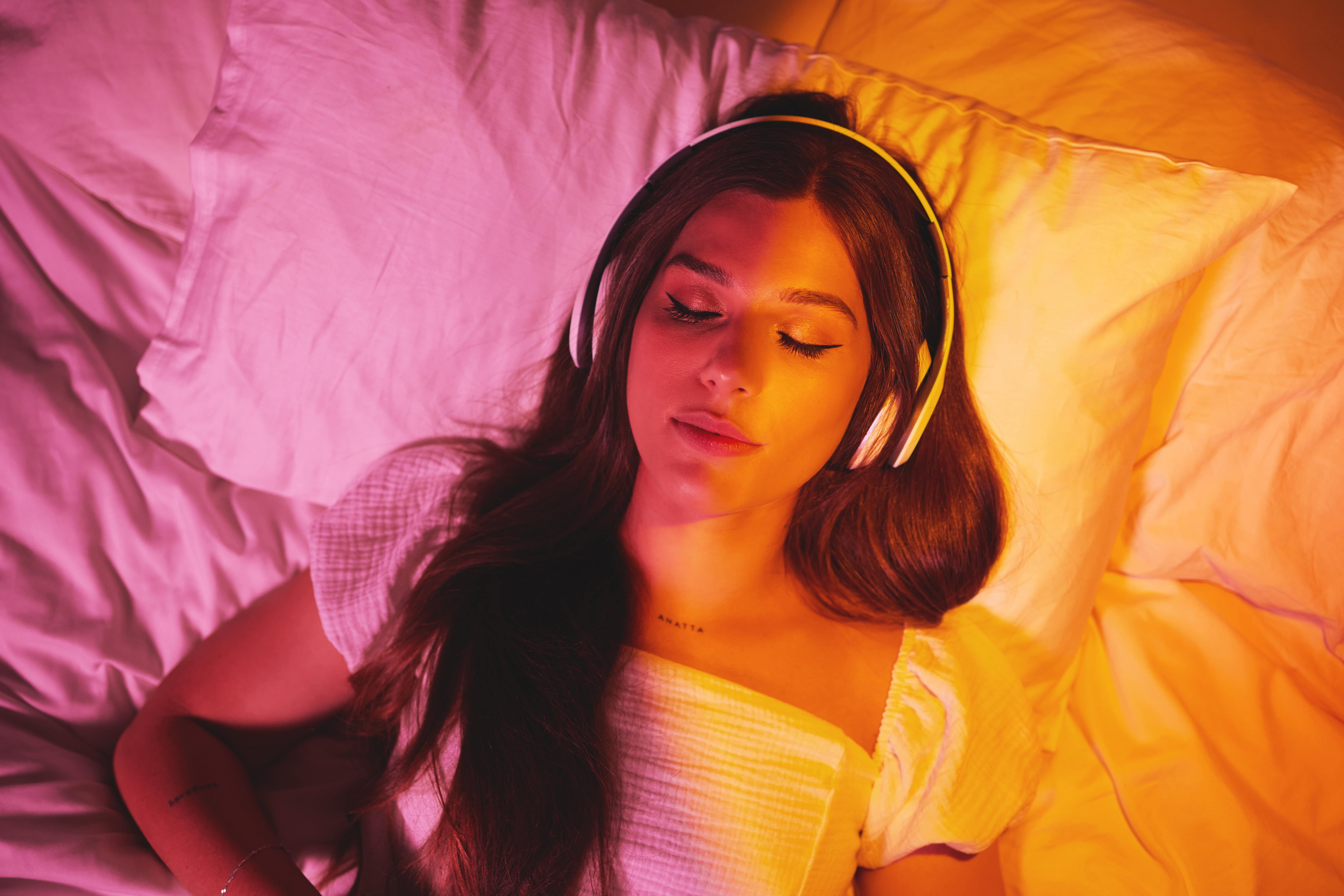Posted by Chris Hardy - Product Copywriter on 24th Apr 2024
Harmonious Dreams: The Profound Benefits of Sleeping with Music
As far as we know, music has always been an integral part of human culture, thought to have been an early form of communication and language in some of the earliest examples of our species. Many of us enjoy music during our waking hours, but its therapeutic effects have been proven to extend into the world of sleep. Incorporating music into our bedtime routine has massively gained popularity, and research suggests that there are several notable benefits to this soothing habit.
Listening to music isn’t just about entertainment anymore, it has been shown to have a major impact on the mind, particularly when it is listened to while sleeping. Our dreams, emotions, and our well-being in general can be improved, and with the help of this article, some of the science behind the connection between music and sleep will be uncovered. We will go through some of the benefits and possible drawbacks, and offer some recommendations for creating a playlist, personalised to hopefully improve your slumber. We’ve got this!
The Science of Music and Sleep
In scientific terms, the relationship between music and sleep is fairly complex, it’s an interplay of neurobiology and psychology, far too in depth to go into here! However, research has shown that listening to music can cause dopamine to be released, this is a neurotransmitter associated with pleasure and reward. When released, a positive emotional state is created, helping to alleviate stress and anxiety, two of the main culprits that get in the way of a good night's sleep. As our body becomes accustomed to this dopamine release over time, we can basically train our mind to have a positive reaction when we hear music. It’s brain training while we sleep! So simple…
Furthermore, the rhythm and tempo of music can have a direct impact on our physiological functions. As you might have guessed, slow and calming music has been found to lower heart rate, but also reduces cortisol levels, and therefore stress, promoting a state of relaxation which helps us sleep. This is often referred to as the "entrainment" effect, put simply, it is where the body synchronises its physiological functions with the rhythmic patterns of the music. It’s like your brain is slow dancing itself to sleep! (1)
Benefits of Listening to Music While You Sleep

1. Stress Reduction
Relaxing music can be just that, relaxing. Listening to it just before bedtime can have some majorly positive effects for some though, helping to unwind the mind, leading us away from the hustle and bustle of the day, into a serene place, ready for sleep.
Many people, particularly those who suffer with depression and anxiety, suffer with racing thoughts, flick book type images, and generally overactive minds as they lay in bed, which often hinders their ability to sleep. Calming music can offer a helpful distraction, taking the mind away from stressful thoughts and feelings, to a mental space that is ready for a good night’s sleep (2).
2. Improved Sleep Quality
It's probably obvious that the calming effect of music can improve sleep quality, it makes sense, as when our mind is at ease, we are more likely to enter the deeper stages of sleep; these stages are crucial for physical and mental recovery. Not only that, but music has been shown help the regulation of our circadian rhythms, otherwise known as our body clock. This is achieved as the music creates a calming atmosphere, aiding the transition between being awake and asleep.
Many people find that they fall asleep faster and experience fewer distractions and disruptions when they introduce music into their sleep routine, however there are large portions of the population that watch TV before sleep. This is something you might want to avoid though, as the blue light created by TV screens has been proven to suppress the production of Melatonin, which is the hormone that regulates the sleep-wake cycle. This can eventually lead to people experiencing long-term health problems, as your brain is kept active when it should be resting. Many experts recommend we actually avoid screen time an hour before bedtime, so your brain can come back to a neutral zone. Who knew there was so much to it?! (3)
3. Enhanced Dream Recall
There have been reports of people experiencing enhanced dream recall when they fall asleep to music. This could be down to the deep emotional and psychological impact music has been known to have on the mind, which could then go on to influence the content and vividness of dreams. Music has a deep connection to us as a species, almost a universal language, one that connects us ancestrally to the earliest stages of mankind, so it’s no wonder that it puts our minds into a state of creativity, allowing us to dream more vividly. It could also be an interesting experiment to see if certain types of music cause you to have different kinds of dreams! Something to consider… (4).
4. Reduced Insomnia Symptoms
People dealing with insomnia may find relief through music therapy. Calming melodies can help break the cycle of racing thoughts and promote a more relaxed mental state, making it easier to fall asleep. Music therapy has emerged as a non-pharmacological intervention to alleviate insomnia symptoms, often in a similar way to white noise machines. People have found that just by having a constant source of sound while they are in bed, insomnia symptoms have started to melt away. In a study done in 2003 of women suffering symptoms of insomnia, the subjects were asked to play an album of their choosing while trying to sleep. Before introducing music to their sleep schedule, it took the test subjects times ranging from 27 to 69 minutes to fall asleep, after introducing music, the times ranged from 6 to 13 minutes (5).
5. Cognitive Performance
Adequate sleep is crucial for cognitive function, and music can aid in achieving this. By facilitating better sleep, music indirectly supports memory consolidation, problem-solving, and overall cognitive performance during waking hours. It has also been shown to improve cognitive ability in children. Parents have used lullabies to soothe their children for centuries, and it has been proven that the slow, gentle rhythms can help babies to fall asleep. Scientific research backs this widely known theory, showing that children even from the earliest stages of life, benefit from hearing music while sleeping. A good night’s sleep is paramount in the development of cognitive performance in children, but also in the ongoing performance in adults.
Choosing the Right Music for Sleep

Not all music is created equal, especially when it comes to getting a good night’s sleep. The key is to try to go for music with a slow tempo, that has minimal fluctuations when it comes to volume, and ideally has soothing melodies. Genres like classical, ambient, chill, and certain types of instrumental music are very often recommended for their calming qualities.
Classical Music
The timeless compositions of classical music, characterised by their melodic structure and moderate tempo, make them a popular choice for bedtime listening. Pieces by composers like Mozart, Beethoven, and Debussy are frequently embraced for their tranquillity. This is why radio stations like Classic FM and BBC Radio 3 almost exclusively play more music at a slower tempo past 9pm; they are leaning into the research.
Ambient and Nature Sounds
Ambient music is usually atmospheric and is often purely instrumental, and is specifically created to provide a calming environment. Recordings of nature sounds, like flowing water, birdsong, whale sounds, or gentle rain can remind us of the sounds we hear in the natural world, which can help you on the road to relaxation. Apps like Calm, Headspace, and Atmosphere either use this in their guided meditation programmes, or allow you to specifically play these sounds.
Instrumental Music
Instrumental genres, like acoustic guitar, piano, or electronic ambient music, can provide a distraction free soundscape, often without lyrics. This lets the mind focus purely on the music itself, which aids the relaxation process. In a similar way to classical music, these genres have been proven to work as sleep aids for decades.
Personalised Playlist
Crafting a personalised playlist, tailored to your preferences is key. Try to experiment with different genres and artists to discover what resonates with you most. Think about creating a playlist with a gradual decrease in tempo, slowly dropping the speed of the music, which will mirror your body's journey into sleep. If you need help or suggestions, there are lots of customised playlists on music streaming services that are specifically created for this purpose. Some are made by the companies themselves, however some are made by members of the general public, so it could be worth looking for inspiration there; its clearly worked for someone else after all! We have also included a guide in this article on how to craft the perfect playlist.
Potential Drawbacks and Considerations

While the benefits of listening to music when sleeping are fairly clear, there are potential drawbacks and considerations to keep in mind.
1. Volume Control
Listening to music at a high volume can be counterproductive, as well as dangerous to your ear health, causing disruptions and distractions rather than helping you to relax. Try to keep the volume at a low-moderate level to avoid overstimulation, too low though and you will find yourself straining to hear it, which could keep your mind alert. Sudden jumps in volume level are also not advised, as they can shock us, and again, cause a disruptive experience. Also, try not to have large jumps in volume between the end of one track and the beginning of another; even a reasonably moderate difference in volume could cause a shock, and keep you awake.
2. Lyrics and Emotional Content
Instrumental music is generally recommended, yet some people find comfort in songs with lyrics. However, it's important to consider the possible effects that emotional content in certain songs may have, as some lyrics may evoke strong emotions that could get in the way of your sleep. Deep and meaningful songs may well have a relaxing backing track, but the lyrics could be nebulous, or confusing, making you expend energy trying to analyse them.
3. Dependency
Relying solely on music to fall asleep may lead to dependency, so it's essential to set yourself up with some good sleep hygiene practices. Things like maintaining a consistent sleep schedule, or creating a more zen sleep environment can help; a tidy sleep space, clean body, clean bedding, a healthy diet and a good routine are all things that are worth considering too, not to mention a comfortable bedframe and mattress with the right comfort rating for you.
4. Sleep Disorders
People who have been diagnosed with sleep disorders, like sleep apnoea or insomnia, should consult a healthcare professional before considering music a “fix”. Music can definitely be helpful, of course, but on its own might not be a solution for certain sleep-related problems. Your health comes first, so, if you are concerned about any sleep-related disorders, you should speak to your GP as soon as you can, don’t just rely on music to solve the problem!
5. Devices and Charging
It is worth noting that it is not advised to keep your devices on charge overnight, as it can damage the life of the battery, and has been shown to be potentially dangerous. It is recommended that you use “adaptive charging” if you can, to help prolong the battery life on your devices, this has become fairly common to be an automatic feature of modern mobile phones for example. If you need a full phone battery when you wake up, and you are using it to play music, then proper charging practices are something you should factor in.
Creating the Ideal Sleep Playlist
Creating a sleep playlist involves a thoughtful curation of music that resonates with you personally. Here are some tips to guide you in crafting the perfect bedtime soundtrack:
1. Start Slow, End Slower
Start your playlist with slower, more calming tunes, which then gradually drop in tempo as you progress; this helps to mimic the body's natural slowing of various functions as it prepares for sleep.
2. Instrumental Dominance
Prioritise instrumental tracks to lower the risk of distractions. However, if you find comfort in songs with lyrics, then choose songs with a soothing and positive vibe.
3. Nature's Embrace
Nature sounds or more ambient tracks that mimic sounds found in peaceful environments have been proven to help, which can enhance the overall calming effect of your playlist.
4. Personal Preferences
The most effective sleep playlist is one that aligns with your personal taste. Experiment with different genres and artists to discover what resonates best with you. If you find Norwegian Black Metal is the thing for you, then it’s all good, just go for it!
5. Consistency is Key
Maintain consistency in your sleep playlist. The familiarity of the music can signal to your brain that it's time to wind down and prepare for sleep. Stick with it!
Sleeping with Music: Our Conclusion
Adding music to your night-time routine can be a simple yet powerful way to improve the quality of your sleep. Soothing melodies, calming rhythms, and the overall ease of the process, could very well lower your stress levels, which in turn, could contribute to an improvement in your overall wellbeing.
It’s definitely important to approach this practice with mindfulness however; making sure you consider your own personal preferences, and weigh up any potential drawbacks. When you make a sleep playlist of your own, and take on good sleep hygiene practices in general of course, you can create a bedtime routine that will help you on the way to a truly rejuvenating night’s sleep, harmonious in every sense!




